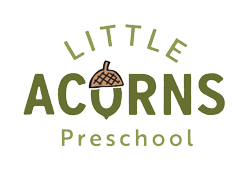Our beliefs
At Little Acorns Preschool we are firm believers that children find well-being through enjoying the simple things in life and by living in the moment.
We feel passionate about wanting the children at Little Acorns to experience feelings of cosiness, happiness, familiarity, simplicity, comfort and contentment; an extension of home. We strive to provide the children with life long skills which they will need to thrive throughout their lives, all the while giving them a sense of belonging, encouraging self-independence, confidence, and the ability to spread kindness.
“Children are like tiny flowers: They are varied and need care, but each is beautiful alone and glorious when seen in the community of peers.”
Friedrich Fröbel (1912).
Froebel’s Chief Writings on Education
Where we play
Little Acorns is situated in the grounds of Penponds School which is located in Higher Penponds. Our building is surrounded by gardens which we utilise throughout the year, no matter the weather. The manager at Little Acorns is a qualified Forest School leader and this plays a big part in our daily routine. We enjoy teaching the children about the importance of nurturing the plants in our garden and watching them grow and flourish akin to our children.
Our indoor environment provides calm and tranquil spaces where the children can access a wide range of stimulating learning opportunities which spark intrigue, creativity and imagination
At Little Acorns we provide quiet places for the children to rest, reflect and communicate peacefully with their peers. We are fortunate to be in a position whereby the staff to child ratios are high. This means that we can operate ‘free flow’ sessions which allow the children to access both our indoor and outdoor spaces during the preschool day. This enables the children to play following their own learning styles.

How we learn
We follow the non-statutory curriculum guidance for the early years foundation stage as outlined in the government document ‘Development Matters’ Development Matters – Non-statutory curriculum guidance for the early years foundation stage (publishing.service.gov.uk). This ensures that we meet the requirements of the educational programmes in the statutory framework for the Early Years Foundation Stage (EYFS).
Characteristics of Effective Learning
In planning and guiding what children learn, we must reflect on the different rates at which children are developing and adjust our practice accordingly. Three characteristics of effective teaching and learning are:

Playing and Exploring
Children investigate and experience things, and ‘have a go’.

Active Learning
Children concentrate and keep on trying if they encounter difficulties, and enjoy achievements.

Creating and Thinking Critically
Children have and develop their own ideas, make links between ideas, and develop strategies for doing things.
7 areas of learning and development
Our practitioners are led by a qualified teacher and together we carefully plan learning and activities through 7 areas of learning ensuring that planning is unique and individual to each child to meet their individual needs.
The 7 areas of learning are split in to three ‘Prime’ areas of learning and four ‘Specific’ areas of learning. the prime areas are important because they lay the foundations for children’s success in all areas of learning and of life:
1
Communication and Language
2
Personal, Social and Emotional
3
Physical
As children grow, the prime areas will help them to develop skills in 4 specific areas. The specific areas provide the range of experiences and opportunities for children to broaden their knowledge and skills:
4
Literacy
5
Mathematics
6
Understanding the World
7
Expressive Art and Design
We endeavor to stimulate children’s natural hunger for learning and creativity. At Little Acorns, we provide children with inspiring and calming environments where their innate curiosity can flourish. Play is powerful; we do not believe in having rigid boundaries that stifles imaginations and independence.
At Little Acorns our learning is topic based and we follow a three yearly rolling programme which we naturally scaffold with the children’s own interests and inquiry.
